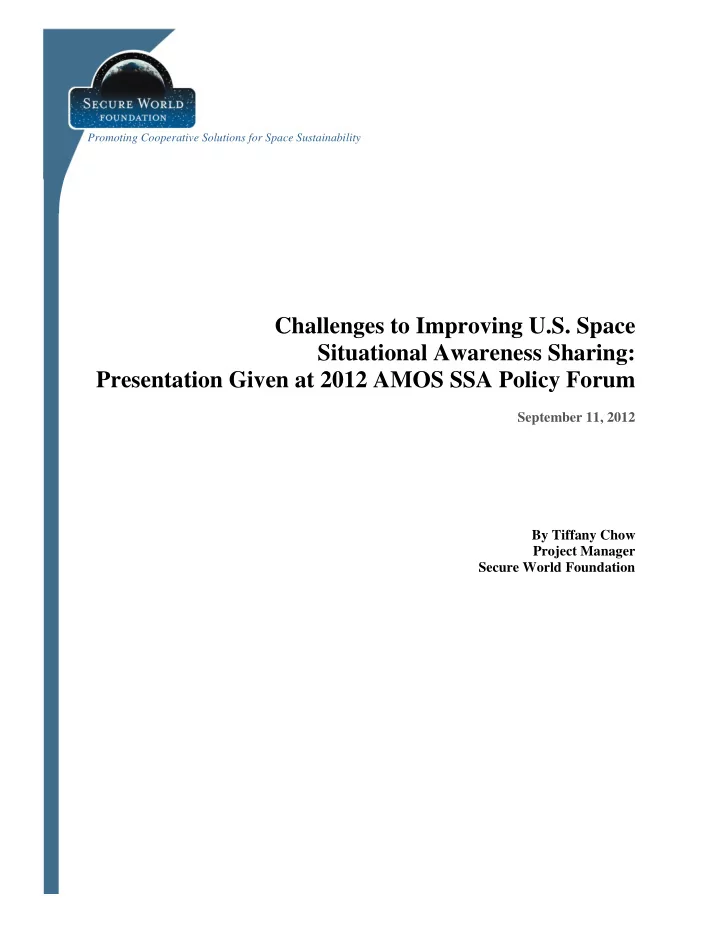

Promoting Cooperative Solutions for Space Sustainability Challenges to Improving U.S. Space Situational Awareness Sharing: Presentation Given at 2012 AMOS SSA Policy Forum September 11, 2012 By Tiffany Chow Project Manager Secure World Foundation
ABOUT SECURE WORLD FOUNDATION Secure World Foundation (SWF) is a private operating foundation dedicated to the secure and sustainable use of space for the benefit of Earth and all its peoples. SWF engages with academics, policy makers, scientists and advocates in the space and international affairs communities to support steps that strengthen global space sustainability. It promotes the development of cooperative and effective use of space for the protection of Earth’s environment and human security. Challenges to Improving U.S. Space Situational Awareness Sharing ii September 11, 2012
ABOUT THE AUTHOR Tiffany Chow is a Project Manager for Secure World Foundation, where she oversees and supports projects dealing with international security and legislative issue areas. She has been active in the international relations and international security fields for the past four years and brings to SWF a diverse range of experience. Prior to joining Secure World Foundation, Tiffany worked for the Center for American Politics and Public Policy at UCLA where she assisted the Director and Administrative Director with research projects and program logistics. Before that, she interned with the Monterey Institute for International Studies' Center for Nonproliferation Studies (CNS) in Washington, DC where she provided research support on a wide array of topics including export control issues in the United Arab Emirates, United Nations Security Council Resolution 1540, and the potential for microreactors to be used for the proliferation of chemical weapons. Tiffany held this internship while participating in the prestigious UCLA Quarter in Washington program, where she also completed a large-scale independent research paper entitled "Reevaluating the Nonproliferation Regime: An Application of John Ruggie's Regime Theory." Education Tiffany received her Master of Arts degree in International Relations from Johns Hopkins University's School of Advanced International Studies (SAIS) in Washington, DC. At SAIS, she specialized in General International Relations and International Economics and was involved in SAIS Leads, the school's leadership development program. She received her Bachelor of Arts degree from the University of California, Los Angeles (UCLA), where she double majored in European Studies and Political Science, with an emphasis in International Relations. She has also studied at the University of Cambridge in England and in Rome, Italy. Challenges to Improving U.S. Space Situational Awareness Sharing iii September 11, 2012
CONTENTS List of Acronyms …………………………………………………………………………… . V Introduction …………………………………………………..…………………………...… 1 Official Position of U.S. Go vernment ……………………………………………………… 1 SPADOC & CAVENet: The Challenges They Create ……………………………………. 2 International Perception ……………………………………………………………………. 2 Conclusions ………………………………………………………………………………...… 4 Challenges to Improving U.S. Space Situational Awareness Sharing iv September 11, 2012
LIST OF ACRONYMS CAVENet – Correction, Analysis, and Verification of Ephemerides Network CSM – Conjunction support Messages IT – Information Technology JSpOC – Joint Space Operations Center SDA – Space Data Association SPADOC – The Space Defense Operations Center SSA – Space situational awareness USG – United States Government Challenges to Improving U.S. Space Situational Awareness Sharing v September 11, 2012
INTRODUCTION For those who are not familiar with our organization, Secure World Foundation is a private operating foundation focused on promoting cooperative solutions to space sustainability. Space sustainability is all about ensuring that we can continue using space in the long-term for all of the benefits it affords us, from national security to environmental monitoring, from communications to navigation, and much more. SWF engages with academics, policy makers, scientists and advocates in the space and international affairs communities to support cooperative solutions that strengthen space sustainability. In pursuit of that space sustainability goal, we have worked extensively on the issue of SSA data sharing and cooperation, specifically from an international perspective. Our overall goal is to see that all satellite owner operators have access to the SSA data and tools that they need to operate safely and responsibly in space. And this comes with a recognition that no one actor alone can bear the cost or responsibility of providing comprehensive, accurate SSA that would ensure safe space operations for the many entities active in space today. In order to get to a place of safe and sustainable space activity, we have to work together on SSA. OFFICIAL POSITION OF THE U.S. GOVERNMENT Recent policy guidance in the 2010 National Space Policy and the 2011 National Security Space Strategy indicates that the U.S. administration shares this sentiment. The U.S. government considers SSA to be an important national security priority. As we all know, the United States military operates the most extensive and advanced SSA network today. It does this because it recognizes that as a country with one of the largest investments in and reliance upon space activities, it pays to keep tabs on the environment to ensure safety of spaceflight and operations. And all of this policy guidance comes with an emphasis on the importance of international cooperation and sharing of this information with others. First through the Commercial and Foreign Entities program and now through its reincarnation, the SSA Sharing Program, the United States shares SSA data with non-U.S. entities, including industry partners and foreign governments. The U.S. government and military does not do this out of the kindness of its heart, but rather, out of an enlightened self-interest, appreciating that space safety and sustainability cannot be achieved unilaterally. However, this practice of sharing faces many challenges, which hinder sharing SSA in the most effective way, ultimately undermining space safety and sustainability. I’ll be talking about a few of those challenges today, especially from an international perspective. Challenges to Improving U.S. Space Situational Awareness Sharing 1 September 11, 2012
Recommend
More recommend